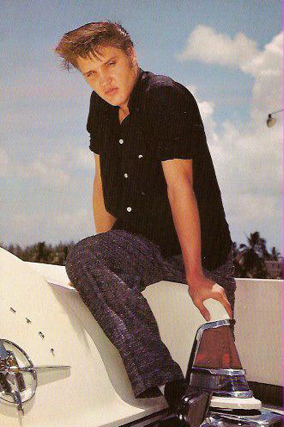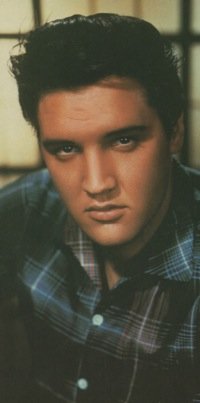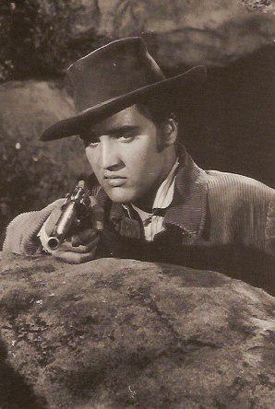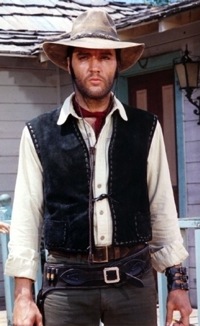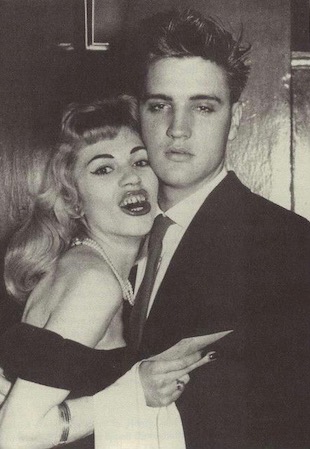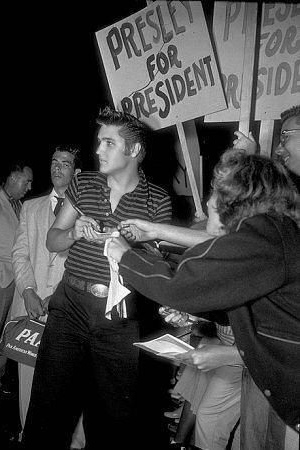Elvis History Blog
Elvis’ Rebellious Image in ’56
Fueled by Gas Station Fight
“I’ll regret this day as long as I live. I guess lots of people were waiting for this kind of thing to happen. It’s getting where I can’t even leave the house without something happening to me.” (The New York Post, October 19, 1956)
That's what Elvis Presley said on October 18, 1956, after posting bail on an assault and disorderly conduct charge in Memphis. Presley participated in a relatively minor scuffle at a service station that afternoon. In fact, if he hadn’t been involved, the story would never have made the local papers. Instead, it was news all over the country. The story is a good example of how an insolated incident in Elvis Presley’s life could wind up having a substantial effect on his public image.
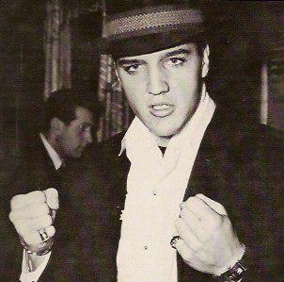
The events leading up to the incident seemed harmless enough. Elvis had just come home to Memphis after a four-day concert tour in Texas. He had a month to rest up before heading back out on the road in late November. Out for a drive in his white Continental Mark II, Elvis smelled some gas fumes and pulled into a service station to have his exhaust line checked for leaks. After the car was checked out, Elvis started the engine to drive away.
However, by that time the sight of the $10,000 automobile and its side-burned driver had drawn a crowd. When a group of young girls approached, Elvis shut off the motor and began signing autographs. With traffic blocked so that other customers couldn’t reach the pumps, the station owner asked Elvis to move his car. The confrontation quickly turned physical, but Elvis and the owner had differing stories about the sequence of events.
• Elvis lands a haymaker on station owner
According to station owner Edd Hopper, he asked the car’s driver three times in a nice way to move his vehicle. “He’d say ‘I’m fixin’ to move,’ but he didn’t,” said Hopper of Elvis. “We didn’t know who he was, but I would have asked anyone to move. The last time I told him he started to get out and I shoved him back in the car. He started out after me.” Elvis threw a right-handed punch that cut a half-inch gash at the corner of Hopper’s left eye. Hopper claimed someone was holding his arms when Presley connected. Aubrey Brown, a station employee, then came running out to his boss’s aid. Elvis took a swing at him, too.
The way Elvis told it, Hopper asked him to move so that other customers could be waited on, but “three young ladies came up and asked me for an autograph.” He said he was obliging them when Hopper slugged him through the window, saying, “I don’t care if you are Elvis Presley.”
Then, according to a United Press story, “Presley, a broad-shouldered, well-built man of 21, who would be in about the light heavyweight class, if slugged for a living rather than strumming and singing, jumped out of his automobile and landed a stiff punch on Hopper’s jaw.” A total of five blows were struck before two Memphis patrolmen standing on the corner rushed in to break up the fracas. A witness, Harvey Huff, told the officers that Hopper had “hit Presley in the back of his head." The cops also claimed that when they first grabbed Hopper, “he was trying to unlimber a small pocket knife.”
Justifying his actions, Elvis said at the scene, “I can take slurring remarks, but when somebody hits you, it’s a different story.”
• Press exaggerated Presley’s vital stats
The tale of the tape for the combatants, according to press reports, was Elvis, age 21, 6’1” and 185 pounds versus Hopper, age 42, 5’5”, 160 pounds, and Brown, age 21 at 225 pounds. Hopper got by far the worst of it. (Witness Huff later said Hopper’s eye looked like a “traveling bag.”) Presley and Brown, who admitted that Elvis “just barely did hit me in the left eye,” emerged with scratches.
All three men were arrested and taken to Police Headquarters, where they were booked on identical charges. When asked to give his name at the station, Elvis quipped, “Well, maybe you’d better put down Carl Perkins.” After all three posted $52 bail, they were ordered to appear in court the next day. About an hour after the fight, a reporter called Elvis's home to get a comment from the singer. However, Vernon Presley told him that his son “was out in the back yard feeding the mule.”
It wasn’t your average day at Memphis City Court the following morning. One reporter counted 207 females on hand when Elvis arrived. “By taxi, auto and even in trucks, the women had descended on City Hall for the trial, causing a terrific traffic jam,” according to the UP report. “There were teen-agers, young married women and a few even carrying babies.” As they scrambled for seats in the courtroom, one asked, “Where is our darling Elvis? If he gets fined, I’ll pay it.”
While Judge Samuel Friedman dealt with a few drunks, a jovial Elvis talked with fans and reporters in the hallway. The three men were then called to the bench to tell their stories. After fining Hopper $25 and Brown $15, Judge Friedman lectured both men against “taking the law into their own hands.” Then he turned to Presley. When Friedman dismissed both charges against the singer, the courtroom erupted in applause. Taking a dim view of the outburst, the judge announced, “This is a court, not a show.”
• Judge advised Elvis to get along with businessmen
Before letting Presley go, Judge Friedman counseled him. “In the future you should take into consideration that you have a large following and should cooperate fully with business people in order to avoid disruptions.” Elvis said that he would and left the courtroom surrounded by a flock of women.
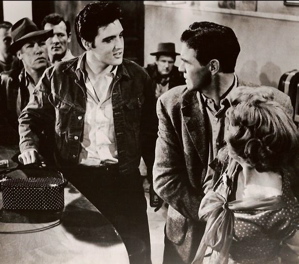
Elvis said he regretted his actions that day at the service station, but the incident certainly didn’t damage his rock ’n’ roll image. Just the opposite, in fact. As one reporter noted, “The rock and roll rage’s press agent couldn’t have dreamed up a better ending for the script.” The nationwide press reports of Elvis slugging it out with a couple of gas station attendants only enhanced his rebellious image among his fans. At the other end of the spectrum, his critics cited the incident as proof of his negative influence on young people. It helped increase the gap between pro and anti-Elvis sentiment, and his pubic profile intensified.
And it wasn’t the last such incident for which Presley made the news in 1956. In November he was involved in a brief barroom fracas when a jealous husband who challenged him to a fight. Blows were thrown but neither man was injured. Then, in March 1957, Elvis pulled a pistol on a young marine during a squabble over a girl in Memphis. (The pistol turned out to be a Hollywood prop, and Elvis wrote a letter of apology to the marine.)
• Elvis took on all-comers on the silver screen
Presley took this street brawling image into his film career. In nearly all of his 31 Hollywood movies, Elvis engaged in fisticuffs with numerous cads and scoundrels. In Jailhouse Rock he even killed a man with his fists.
Was Elvis a tough guy in real life? He appears to have been a scrapper when young, but once he became famous he surrounded himself with some real “bad asses” (most notably Red West) to do his fighting for him. Unfortunately, later in his life, Elvis’ bizarre behavior included some overly aggressive delusions, involving karate, guns, and badges. Perhaps he just lost the ability to tell the difference between his tough guy image and who he really was. — Alan Hanson | © May 2010
Go to Elvis 1956
Go to Home Page
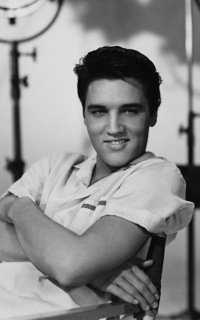
“By taxi, auto and even in trucks, the women had descended on City Hall for the trial, causing a terrific traffic jam. There were teen-agers, young married women and a few even carrying babies.”
